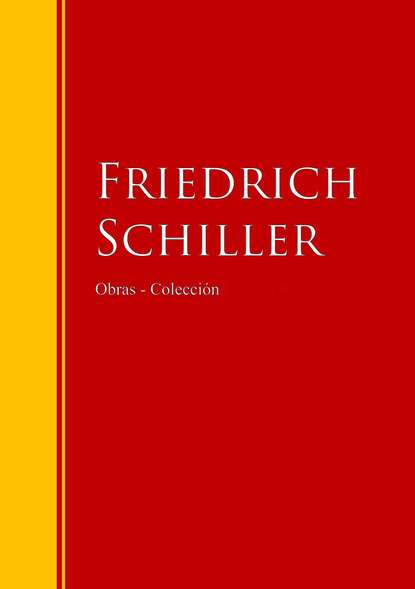 Полная версия
Полная версияПолная версия:
Фридрих Шиллер Aesthetical Essays of Friedrich Schiller
- + Увеличить шрифт
- - Уменьшить шрифт

Friedrich Schiller
Aesthetical Essays of Friedrich Schiller
INTRODUCTION
The special subject of the greater part of the letters and essays of Schiller contained in this volume is Aesthetics; and before passing to any remarks on his treatment of the subject it will be useful to offer a few observations on the nature of this topic, and on its treatment by the philosophical spirit of different ages.
First, then, aesthetics has for its object the vast realm of the beautiful, and it may be most adequately defined as the philosophy of art or of the fine arts. To some the definition may seem arbitrary, as excluding the beautiful in nature; but it will cease to appear so if it is remarked that the beauty which is the work of art is higher than natural beauty, because it is the offspring of the mind. Moreover, if, in conformity with a certain school of modern philosophy, the mind be viewed as the true being, including all in itself, it must be admitted that beauty is only truly beautiful when it shares in the nature of mind, and is mind's offspring.
Viewed in this light, the beauty of nature is only a reflection of the beauty of the mind, only an imperfect beauty, which as to its essence is included in that of the mind. Nor has it ever entered into the mind of any thinker to develop the beautiful in natural objects, so as to convert it into a science and a system. The field of natural beauty is too uncertain and too fluctuating for this purpose. Moreover, the relation of beauty in nature and beauty in art forms a part of the science of aesthetics, and finds again its proper place.
But it may be urged that art is not worthy of a scientific treatment. Art is no doubt an ornament of our life and a charm to the fancy; but has it a more serious side? When compared with the absorbing necessities of human existence, it might seem a luxury, a superfluity, calculated to enfeeble the heart by the assiduous worship of beauty, and thus to be actually prejudicial to the true interest of practical life. This view seems to be largely countenanced by a dominant party in modern times, and practical men, as they are styled, are only too ready to take this superficial view of the office of art.
Many have indeed undertaken to defend art on this score, and to show that, far from being a mere luxury, it has serious and solid advantages. It has been even apparently exaggerated in this respect, and represented as a kind of mediator between reason and sense, between inclination and duty, having as its mission the work of reconciling the conflicting elements in the human heart. A strong trace of this view will be found in Schiller, especially in all that he says about the play-instinct in his "Aesthetical Letters."
Nevertheless, art is worthy of science; aesthetics is a true science, and the office of art is as high as that assigned to it in the pages of Schiller. We admit that art viewed only as an ornament and a charm is no longer free, but a slave. But this is a perversion of its proper end. Science has to be considered as free in its aim and in its means, and it is only free when liberated from all other considerations; it rises up to truth, which is its only real object, and can alone fully satisfy it. Art in like manner is alone truly art when it is free and independent, when it solves the problem of its high destination – that problem whether it has to be placed beside religion and philosophy as being nothing else than a particular mode or a special form of revealing God to consciousness, and of expressing the deepest interests of human nature and the widest truths of the human mind.
For it is in their works of art that the nations have imprinted their favorite thoughts and their richest intuitions, and not unfrequently the fine arts are the only means by which we can penetrate into the secrets of their wisdom and the mysteries of their religion.
It is made a reproach to art that it produces its effects by appearance and illusion; but can it be established that appearance is objectionable? The phenomena of nature and the acts of human life are nothing more than appearances, and are yet looked upon as constituting a true reality; for this reality must be sought for beyond the objects perceived immediately by the sense, the substance and speech and principle underlying all things manifesting itself in time and space through these real existences, but preserving its absolute existence in itself. Now, the very special object and aim of art is to represent the action and development of this universal force. In nature this force or principle appears confounded with particular interests and transitory circumstances, mixed up with what is arbitrary in the passions and in individual wills. Art sets the truth free from the illusory and mendacious forms of this coarse, imperfect world, and clothes it in a nobler, purer form created by the mind itself. Thus the forms of art, far from being mere appearances, perfectly illusory, contain more reality and truth than the phenomenal existences of the real world. The world of art is truer than that of history or nature.
Nor is this all: the representations of art are more expressive and transparent than the phenomena of the real world or the events of history. The mind finds it harder to pierce through the hard envelop of nature and common life than to penetrate into works of art.
Two more reflections appear completely to meet the objection that art or aesthetics is not entitled to the name of science.
It will be generally admitted that the mind of man has the power of considering itself, of making itself its own object and all that issues from its activity; for thought constitutes the essence of the mind. Now art and its work, as creations of the mind, are themselves of a spiritual nature. In this respect art is much nearer to the mind than nature. In studying the works of art the mind has to do with itself, with what proceeds from itself, and is itself.
Thus art finds its highest confirmation in science.
Nor does art refuse a philosophical treatment because it is dependent on caprice, and subject to no law. If its highest aim be to reveal to the human consciousness the highest interest of the mind, it is evident that the substance or contents of the representations are not given up to the control of a wild and irregular imagination. It is strictly determined by the ideas that concern our intelligence and by the laws of their development, whatever may be the inexhaustible variety of forms in which they are produced. Nor are these forms arbitrary, for every form is not fitted to express every idea. The form is determined by the substance which it has to suit.
A further consideration of the true nature of beauty, and therefore of the vocation of the artist, will aid us still more in our endeavor to show the high dignity of art and of aesthetics. The history of philosophy presents us with many theories on the nature of the beautiful; but as it would lead us too far to examine them all, we shall only consider the most important among them. The coarsest of these theories defines the beautiful as that which pleases the senses. This theory, issuing from the philosophy of sensation of the school of Locke and Condillac, only explains the idea and the feeling of the beautiful by disfiguring it. It is entirely contradicted by facts. For it converts it into desire, but desire is egotistical and insatiable, while admiration is respectful, and is its own satisfaction without seeking possession.
Others have thought the beautiful consists in proportion, and no doubt this is one of the conditions of beauty, but only one. An ill-proportioned object cannot be beautiful, but the exact correspondence of parts, as in geometrical figures, does not constitute beauty.
A noted ancient theory makes beauty consist in the perfect suitableness of means to their end. In this case the beautiful is not the useful, it is the suitable; and the latter idea is more akin to that of beauty. But it has not the true character of the beautiful. Again, order is a less mathematical idea than proportion, but it does not explain what is free and flowing in certain beauties.
The most plausible theory of beauty is that which makes it consist in two contrary and equally necessary elements – unity and variety. A beautiful flower has all the elements we have named; it has unity, symmetry, and variety of shades of color. There is no beauty without life, and life is movement, diversity. These elements are found in beautiful and also in sublime objects. A beautiful object is complete, finished, limited with symmetrical parts. A sublime object whose forms, though not out of proportion, are less determined, ever awakens in us the feeling of the infinite. In objects of sense all qualities that can produce the feeling of the beautiful come under one class called physical beauty. But above and beyond this in the region of mind we have first intellectual beauty, including the laws that govern intelligence and the creative genius of the artist, the poet, and the philosopher. Again, the moral world has beauty in its ideas of liberty, of virtue, of devotion, the justice of Aristides, the heroism of Leonidas.
We have now ascertained that there is beauty and sublimity in nature, in ideas, in feelings, and in actions. After all this it might be supposed that a unity could be found amidst these different kinds of beauty. The sight of a statue, as the Apollo of Belvedere, of a man, of Socrates expiring, are adduced as producing impressions of the beautiful; but the form cannot be a form by itself, it must be the form of something. Physical beauty is the sign of an interior beauty, a spiritual and moral beauty which is the basis, the principle, and the unity of the beautiful.
Physical beauty is an envelop to intellectual and to moral beauty.
Intellectual beauty, the splendor of the true, can only have for principle that of all truth.
Moral beauty comprehends two distinct elements, equally beautiful, justice and charity. Thus God is the principle of the three orders of beauty, physical, intellectual, and moral. He also construes the two great powers distributed over the three orders, the beautiful and the sublime. God is beauty par excellence; He is therefore perfectly beautiful; He is equally sublime. He is to us the type and sense of the two great forms of beauty. In short, the Absolute Being as absolute unity and absolute variety is necessarily the ultimate principle, the extreme basis, the finished ideal of all beauty. This was the marvellous beauty which Diotimus had seen, and which is described in the Banquet of Socrates.
It is our purpose after the previous discussion to attempt to elucidate still further the idea of art by following its historic development.
Many questions bearing on art and relating to the beautiful had been propounded before, even as far back as Plotinus, Plato, and Socrates, but recent times have been the real cradle of aesthetics as a science. Modern philosophy was the first to recognize that beauty in art is one of the means by which the contradictions can be removed between mind considered in its abstract and absolute existence and nature constituting the world of sense, bringing back these two factors to unity.
Kant was the first who felt the want of this union and expressed it, but without determining its conditions or expressing it scientifically. He was impeded in his efforts to effect this union by the opposition between the subjective and the objective, by his placing practical reason above theoretical reason, and he set up the opposition found in the moral sphere as the highest principle of morality. Reduced to this difficulty, all that Kant could do was to express the union under the form of the subjective ideas of reason, or as postulates to be deduced from the practical reason, without their essential character being known, and representing their realization as nothing more than a simple you ought, or imperative "Du sollst."
In his teleological judgment applied to living beings, Kant comes, on the contrary, to consider the living organism in such wise that, the general including the particular, and determining it as an end, consequently the idea also determines the external, the compound of the organs, not by an act springing from without but issuing from within. In this way the end and the means, the interior and exterior, the general and particular, are confounded in unity. But this judgment only expresses a subjective act of reflection, and does not throw any light on the object in itself. Kant has the same view of the aesthetic judgment. According to him the judgment does not proceed either from reason, as the faculty of general ideas, or from sensuous perception, but from the free play of the reason and of the imagination. In this analysis of the cognitive faculty, the object only exists relatively to the subject and to the feeling of pleasure or the enjoyment that it experiences.
The characteristics of the beautiful are, according to Kant: —
1. The pleasure it procures is free from interest.
2. Beauty appears to us as an object of general enjoyment, without awakening in us the consciousness of an abstract idea and of a category of reason to which we might refer our judgment.
3. Beauty ought to embrace in itself the relation of conformity to its end, but in such a way that this conformity may be grasped without the idea of the end being offered to our mind.
4. Though it be not accompanied by an abstract idea, beauty ought to be acknowledged as the object of a necessary enjoyment.
A special feature of all this system is the indissoluble unity of what is supposed to be separated in consciousness. This distinction disappears in the beautiful, because in it the general and the particular, the end and the means, the idea and the object, mentally penetrate each other completely. The particular in itself, whether it be opposed to itself or to what is general, is something accidental. But here what may be considered as an accidental form is so intimately connected with the general that it is confounded and identified with it. By this means the beautiful in art presents thought to us as incarnate. On the other hand, matter, nature, the sensuous as themselves possessing measure, end, and harmony, are raised to the dignity of spirit and share in its general character. Thought not only abandons its hostility against nature, but smiles in her. Sensation and enjoyment are justified and sanctified, so that nature and liberty, sense and ideas, find their justification and their sanctification in this union. Nevertheless this reconciliation, though seemingly perfect, is stricken with the character of subjectiveness. It cannot constitute the absolutely true and real.
Such is an outline of the principal results of Kant's criticism, and Hegel passes high praise on the profoundly philosophic mind of Schiller, who demanded the union and reconciliation of the two principles, and who tried to give a scientific explanation of it before the problem had been solved by philosophy. In his "Letters on Aesthetic Education," Schiller admits that man carries in himself the germ of the ideal man which is realized and represented by the state. There are two ways for the individual man to approach the ideal man; first, when the state, considered as morality, justice, and general reason, absorbs the individualities in its unity; secondly, when the individual rises to the ideal of his species by the perfecting of himself. Reason demands unity, conformity to the species; nature, on the other hand, demands plurality and individuality; and man is at once solicited by two contrary laws. In this conflict, aesthetic education must come in to effect the reconciliation of the two principles; for, according to Schiller, it has as its end to fashion and polish the inclinations and passions so that they may become reasonable, and that, on the other hand, reason and freedom may issue from their abstract character, may unite with nature, may spiritualize it, become incarnate, and take a body in it. Beauty is thus given as the simultaneous development of the rational and of the sensuous, fused together, and interpenetrated one by the other, an union that constitutes in fact true reality.
This unity of the general and of the particular, of liberty and necessity of the spiritual and material, which Schiller understood scientifically as the spirit of art, and which he tried to make appear in real life by aesthetic art and education, was afterwards put forward under the name of idea as the principle of all knowledge and existence. In this way, through the agency of Schelling, science raised itself to an absolute point of view. It was thus that art began to claim its proper nature and dignity. From that time its proper place was finally marked out for it in science, though the mode of viewing it still labored under certain defects. Its high and true distinction were at length understood.
In viewing the higher position to which recent philosophical systems have raised the theory of art in Germany, we must not overlook the advantages contributed by the study of the ideal of the ancients by such men as Winckelmann, who, by a kind of inspiration, raised art criticism from a carping about petty details to seek the true spirit of great works of art, and their true ideas, by a study of the spirit of the originals.
It has appeared expedient to conclude this introduction with a summary of the latest and highest theory of art and aesthetics issuing from Kant and Schiller, and developed in the later philosophy of Hegel.
Our space only allows us to give a glance, first, at the metaphysics of the beautiful as developed by Hegel in the first part of his 'Aesthetik,' and then at the later development of the same system in recent writers issuing from his school.
Hegel considers, first, the abstract idea of the beautiful; secondly, beauty in nature; thirdly, beauty in art or the ideal; and he winds up with an examination of the qualities of the artist.
His preliminary remarks are directed to show the relations of art to religion and philosophy, and he shows that man's destination is an infinite development. In real life he only satisfies his longing partially and imperfectly by limited enjoyments. In science he finds a nobler pleasure, and civil life opens a career for his activity; but he only finds an imperfect pleasure in these pursuits. He cannot then find the ideal after which he sighs. Then he rises to a higher sphere, where all contradictions are effaced and the ideas of good and happiness are realized in perfect accord and in constant harmony. This deep want of the soul is satisfied in three ways: in art, in religion, and in philosophy.
Art is intended to make us contemplate the true and the infinite in forms of sense. Yet even art does not fully satisfy the deepest need of the soul. The soul wants to contemplate truth in its inmost consciousness. Religion is placed above the dominion of art.
First, as to idea of the beautiful, Hegel begins by giving its characteristics. It is infinite, and it is free; the contemplation of the beautiful suffices to itself, it awakens no desire. The soul experiences something like a godlike felicity and is transported into a sphere remote from the miseries of life. This theory of the beautiful comes very near that of Plato.
Secondly, as to beauty in nature. Physical beauty, considered externally, presents itself successively under the aspects of regularity and of symmetry, of conformity with a law, and of harmony, also of purity and simplicity of matter.
Thirdly, beauty in art or the ideal is beauty in a higher degree of perfection than real beauty. The ideal in art is not contrary to the real, but the real idealized, purified, and perfectly expressed. The ideal is also the soul arrived at the consciousness of itself, free and fully enjoying its faculties; it is life, but spiritual life and spirit. Nor is the ideal a cold abstraction, it is the spiritual principle under the form of a living individuality freed from the laws of the finite. The ideal in its highest form is the divine, as expressed in the Greek divinities; the Christian ideal, as expressed in all its highest purity in God the Father, the Christ, the Virgin. Its essential features are calm, majesty, serenity.
At a lower degree the ideal is in man the victory of the eternal principles that fill the human heart, the triumph of the nobler part of the soul, the moral and divine principle.
But the ideal manifested in the world becomes action, and action implies a form of society, a determinate situation with collision, and an action properly so called. The heroic age is the best society for the ideal in action; in its determinate situation the ideal in action must appear as the manifestation of moral power, and in action, properly so called, it must contain three points in the ideal: first, general principles; secondly, personages; thirdly, their character and their passions. Hegel winds up by considering the qualities necessary in an artist: imagination, genius, inspiration, originality, etc.
A recent exponent of Hegel's aesthetical ideas further developed expresses himself thus on the nature of beauty: —
"After the bitterness of the world, the sweetness of art soothes and refreshes us. This is the high value of the beautiful – that it solves the contradiction of mind and matter, of the moral and sensuous world, in harmony. Thus the beautiful and its representation in art procures for intuition what philosophy gives to the cognitive insight and religion to the believing frame of mind. Hence the delight with which Schiller's wonderful poem on the Bell celebrates the accord of the inner and outer life, the fulfilment of the longing and demands of the soul by the events in nature. The externality of phenomena is removed in the beautiful; it is raised into the circle of ideal existence; for it is recognized as the revelation of the ideal, and thus transfigured it gives to the latter additional splendor."
"Thus the beautiful is active, living unity, full existence without defect, as Plato and Schelling have said, or as recent writers describe it; the idea that is quite present in the appearance, the appearance which is quite formed and penetrated by the idea."
"Beauty is the world secret that invites us in image and word," is the poetical expression of Plato; and we may add, because it is revealed in both. We feel in it the harmony of the world; it breaks forth in a beauty, in a lovely accord, in a radiant point, and starting thence we penetrate further and yet further, and find as the ground of all existence the same charm which had refreshed us in individual forms. Thus Christ pointed to the lilies of the field to knit His followers' reliance on Providence with the phenomena of nature: and could they jet forth in royal beauty, exceeding that of Solomon, if the inner ground of nature were not beauty?
We may also name beauty in a certain sense a mystery, as it mediates to us in a sensuous sign a heavenly gift of grace, that it opens to us a view into the eternal Being, teaching us to know nature in God and God in nature, that it brings the divine even to the perception of sense, and establishes the energy of love and freedom as the ground, the bond, and the end of the world.
In the midst of the temporal the eternal is made palpable and present to us in the beautiful, and offers itself to our enjoyment. The separation is suppressed, and the original unity, as it is in God, appears as the first, as what holds together even the past in the universe, and what constitutes the aim of the development in a finite accord.
The beautiful not only presents itself to us as mediator of a foreign excellence or of a remote divinity, but the ideal and the godlike are present in it. Hence aesthetics requires as its basis the system in which God is known as indwelling in the world, that He is not far distant from any one of us, but that He animates us, and that we live in Him. Aesthetics requires the knowledge that mind is the creative force and unity of all that is extended and developed in time and space.
The beautiful is thus, according to these later thinkers, the revelation of God to the mind through the senses; it is the appearance of the idea. In the beautiful spirit reveals itself to spirit through matter and the senses; thus the entire man feels himself raised and satisfied by it. By the unity of the beautiful with us we experience with delight that thought and the material world are present for our individuality, that they utter tones and shine forth in it, that both penetrate each other and blend in it and thus become one with it. We feel one with them and one in them.





